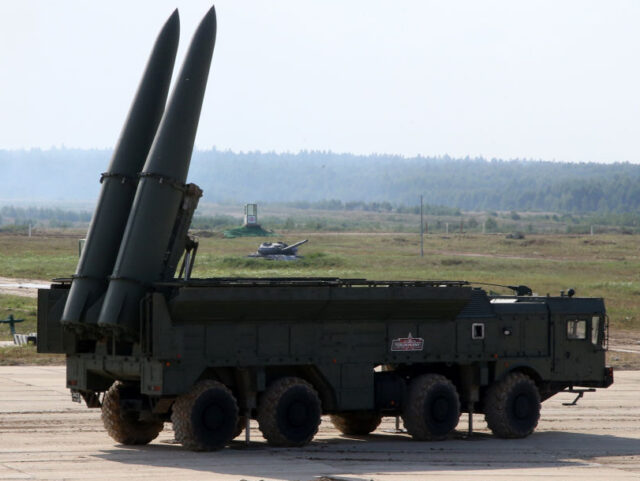Russia is again attempting to threaten NATO, claiming to be making good on parts of Vladimir Putin’s statement that he would be — eventually –moving nuclear weapons into Belarus.
Shorter range but operationally flexible, “Iskander-M tactical missile systems” have been deployed to Belarus, and Belarussian crews have travelled to Russia to receive training in their operation, Moscow has said. The missile can be equipped with several different warheads using conventional explosives for different purposes, or it can carry a small nuclear warhead.
A statement published by a Russian government wires service on these comments by defence minister Sergey Shoigu on the deployment of nuclear-capable weapon systems to Belarus, which borders four European Union members, appeared to have been timed to coincide with Tuesday’s ceremony to welcome Finland to the North Atlantic Treaty Organisation (NATO). Russia has long campaigned against Finland joining NATO, and protested NATO expansion in general, accusing the bloc of encroaching upon their territory.
Moscow said it will keep a “close eye” on their new 800-mile border with NATO, and threatened “counter measures” including “all necessary military-technical precaution measures”.
NATO leaders have recently called Russia’s desire to move nuclear weapons to Belarus dangerous, irresponsible, and desperate, but that it was not considered serious enough to modify NATO’s own nuclear disposition. On Monday, NATO leader Jens Stoltenberg said the alliance and Europe was stronger with Finland as a member.
Shoigu’s comments on the Iskander missiles were accompanied by a claim that, TASS notes, “some of Belarusian attack aircraft are now capable of striking enemy facilities with nuclear weapons”. Russia has not yet claimed that nuclear weapons have actually gone to Belarus — there is not thought to be any facility in the country capable of storing or maintaining them, yet — just apparently the means to use them.
These claims of placing the equipment to use nuclear weapons in the future at short notice by giving the Belarussian armed forces dual-use missiles and launch systems for combat aircraft follows comments by Putin last month threatening nuclear weapons on Europe’s eastern border. The plan was discussed in public a year ago after Belarus had a referendum to lift its own constitutional block to having nuclear on its soil. Russia has insisted it will not give control of nuclear weapons to Belarus.
Indeed, Moscow has defended these deployments by comparing them to the United States staging its own nuclear weapons in NATO members in Europe and also that it does not violate the Treaty on the Non-Proliferation of Nuclear Weapons. That claim will be one for international lawyers of the future, but nevertheless, the United States does base nuclear weapons in Europe with the permission of host nations, and these can even be launched by those partners from their aircraft in wartime.
Russia’s move may appear from the outside to closely model that of the United States, possibly to avoid escalation, although accusations have already been made.
Speaking for themselves, Russia’s deputy foreign minister Sergey Ryabkov spoke on television Tuesday evening, insisting that Russia has the “military resources and the political will” to protect itself. Moving onto nuclear weapons, he told his domestic audience: “We are not mincing words here, either. Our adversaries simply have to be realistic about what is going on around them, and to refrain from any escalation or provocations against us. Because otherwise something may happen that for now can be discussed only hypothetically.”

COMMENTS
Please let us know if you're having issues with commenting.